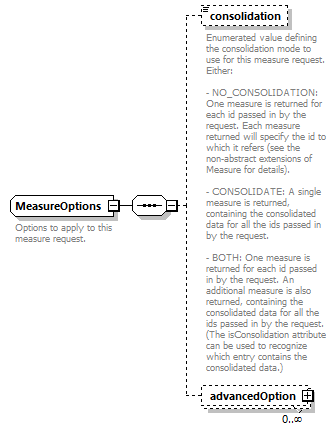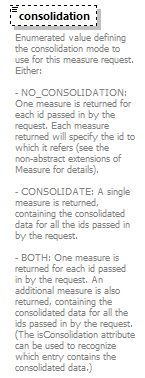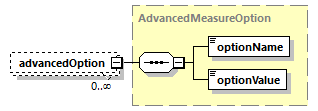| diagram |  |
||
| namespace | http://base.api.ec.n2.tibco.com | ||
| children | consolidation advancedOption | ||
| used by | |||
| annotation |
|
||
| source | <xs:complexType name="MeasureOptions"> <xs:annotation> <xs:documentation>Options to apply to this measure request.</xs:documentation> </xs:annotation> <xs:sequence> <xs:element name="consolidation" type="ConsolidationType" minOccurs="0" maxOccurs="1"> <xs:annotation> <xs:documentation>Enumerated value defining the consolidation mode to use for this measure request. Either: - NO_CONSOLIDATION: One measure is returned for each id passed in by the request. Each measure returned will specify the id to which it refers (see the non-abstract extensions of Measure for details). - CONSOLIDATE: A single measure is returned, containing the consolidated data for all the ids passed in by the request. - BOTH: One measure is returned for each id passed in by the request. An additional measure is also returned, containing the consolidated data for all the ids passed in by the request. (The isConsolidation attribute can be used to recognize which entry contains the consolidated data.)</xs:documentation> </xs:annotation> </xs:element> <xs:element name="advancedOption" type="AdvancedMeasureOption" minOccurs="0" maxOccurs="unbounded"/> </xs:sequence> </xs:complexType> |
element MeasureOptions/consolidation
| diagram |  |
||||||||||||
| type | ConsolidationType | ||||||||||||
| properties |
|
||||||||||||
| facets |
|
||||||||||||
| annotation |
|
||||||||||||
| source | <xs:element name="consolidation" type="ConsolidationType" minOccurs="0" maxOccurs="1"> <xs:annotation> <xs:documentation>Enumerated value defining the consolidation mode to use for this measure request. Either: - NO_CONSOLIDATION: One measure is returned for each id passed in by the request. Each measure returned will specify the id to which it refers (see the non-abstract extensions of Measure for details). - CONSOLIDATE: A single measure is returned, containing the consolidated data for all the ids passed in by the request. - BOTH: One measure is returned for each id passed in by the request. An additional measure is also returned, containing the consolidated data for all the ids passed in by the request. (The isConsolidation attribute can be used to recognize which entry contains the consolidated data.)</xs:documentation> </xs:annotation> </xs:element> |
element MeasureOptions/advancedOption
| diagram |  |
||||||
| type | AdvancedMeasureOption | ||||||
| properties |
|
||||||
| children | optionName optionValue | ||||||
| source | <xs:element name="advancedOption" type="AdvancedMeasureOption" minOccurs="0" maxOccurs="unbounded"/> |
WSDL documentation generated by XMLSpy WSDL Editor http://www.altova.com/xmlspy